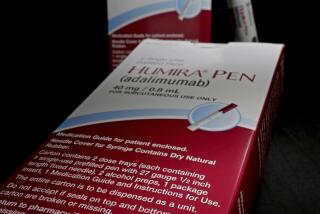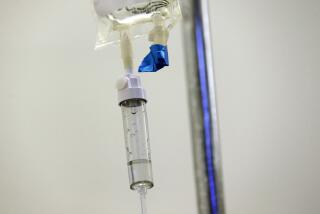Fears of Bird Flu Give New Life to Waning Antiviral
- Share via
Global fears over bird flu have sent sales soaring for an antiviral drug once dismissed as a commercial dud, but the two companies responsible for the drug are locked in a bitter court battle over profits.
Australian biotechnology firm Biota Inc. invented the drug Relenza in 1989, but the next year sold control of it to GlaxoSmithKline in exchange for about 6% of future sales.
In 1999, the U.S. Food and Drug Administration approved Relenza to treat the flu, and the two partners had cause to celebrate. Sales jumped and Biota’s stock, traded on the Australian stock market, rose to $9 and drove the company’s market capitalization to $500 million.
But by 2001, sales of Relenza -- taken like an asthma inhaler -- fell to almost nothing as a competing antiviral pill called Tamiflu, created by a California company and also approved in 1999, proved more popular with doctors and their patients. Biota’s stock now trades in the $1-to-$2 range.
“Relenza did not have significant uptake as a commercial product,” said Glaxo spokeswoman Nancy Pekarek. “Pills are generally a more popular form of taking medicine.”
Then the bird-flu scare hit.
Orders for Relenza poured in after the World Health Organization advised governments in 2004 to stockpile as much antiviral medicine as possible in case of an outbreak. In the last six months of 2005, for instance, the French, Australian and German governments ordered 12.5 million doses of Relenza. Before 2005, Glaxo sold an average of 500,000 doses a year.
Although Tamiflu still owns an overwhelming majority of an antiviral market that has reached $3 billion, attention has recently shifted to Relenza as Tamiflu maker Roche Inc. struggles to keep up with demand.
Biota sued Glaxo two years ago in Australia, alleging that the drug maker failed to market Relenza properly. A trial is expected next year if the two sides don’t settle.
Biota argues that Relenza’s sagging popularity had little to do with a patient preference for pills and was really the result of Glaxo’s refusal to spend money to promote the drug.
Biota Chief Executive Peter Cook said he didn’t buy Glaxo’s rationale for Relenza’s poor past sales because Glaxo’s most popular drug is the inhaled asthma fighter Advair, which had $5.2 billion in sales last year.
“They understand how to educate the prescribers,” said Cook, who was in Chicago this week attending a biotechnology industry conference. Both drugs cut down on hospitalizations and even death when patients with conventional influenza take them within 48 hours of infection.
Although neither is a vaccine, the FDA has recently approved them for use as a preventive treatment in addition to their traditional use after infection for the common flu.
“Having a stockpile of antiviral drugs is an important part of our pandemic influenza preparedness plan,” Health and Human Services Secretary Mike Leavitt said March 1 in announcing an order for 1.75 million doses of Relenza. The United States has ordered a total of 4.8 million Relenza doses.
A study published last year in the British medical journal The Lancet found Relenza was at least as effective as Tamiflu, and had fewer side effects, boosting Relenza’s popularity even more.
Demand for Relenza is rising so much that Glaxo plans to hike production from 1 million doses last year to 15 million doses by year-end, and 40 million by 2007.
Glaxo won’t disclose sales figures for Relenza, but Biota reckons annual sales last year totaled about $300 million and could skyrocket when production is ramped up.
If Glaxo reaches Biota’s Relenza sales projection of close to $500 million in the next year, Biota would earn about $28 million and become instantly profitable. It lost about $10 million last year.
The legal spat between Biota and Glaxo mirrors a similar dispute between Burlingame, Calif.-based Gilead Sciences and Swiss drug company Roche over Tamiflu. Gilead created Tamiflu, but the biotechnology firm licensed marketing rights to Roche in exchange for royalties.
Last year, Roche paid Gilead $62.5 million to settle similar allegations that the drug giant failed to properly market Tamiflu. Tamiflu racked up $1.2 billion in sales last year.
Mark Saunders, a lawyer and president of Global Markets Capital Group, a New York firm that helps life sciences companies with mergers and acquisitions, said the recent surge in Relenza sales seems to bolster Biota’s case.
“Maybe if Relenza was promoted with the same enthusiasm as Tamiflu, then it may have been on equal footing now,” he said. “In retrospect, it appears to be a very good drug.”
More to Read
Inside the business of entertainment
The Wide Shot brings you news, analysis and insights on everything from streaming wars to production — and what it all means for the future.
You may occasionally receive promotional content from the Los Angeles Times.










